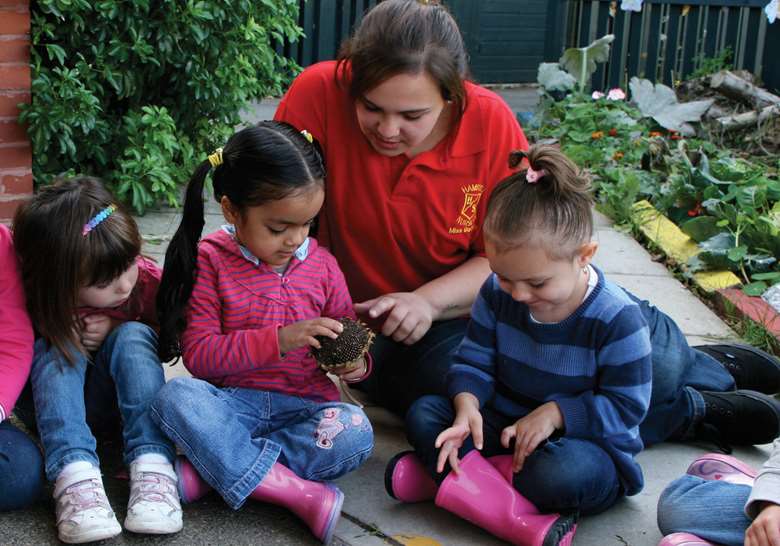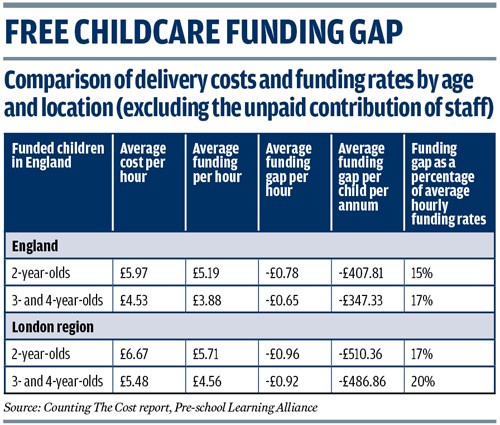Childcare providers call for review of free entitlement funding model
Derren Hayes
Tuesday, November 25, 2014
Latest research shows a 20 per cent funding gap between the cost of delivering free childcare and the amount paid to providers, with experts warning it could jeopardise the government programme if not addressed.

A study released earlier this month exposed the extent of the funding gap between how much it costs early years providers to deliver free childcare places and the amount they receive from the government to pay for it.
The Counting The Cost report from the Pre-school Learning Alliance concluded that the average private, voluntary and independent (PVI) nursery is receiving between 15 and 20 per cent less in government funding than the cost of providing a place to a two-, three- and four-year-old under the free childcare programme (see table).
The findings - drawn from a study of childcare costs of 5,635 children across 100 early years settings and the rates paid by local authorities for providing free places - found an average shortfall of 65p/hour (17 per cent) for three- and four-year-olds, and 78p/hour (15 per cent) for two-year-olds. The funding gap rose to 20 and 17 per cent respectively in London.
When extrapolated across the country, the findings suggest the annual funding gap is £206m.
Under the free childcare programme, all three- and four-year-olds are eligible to receive 15 hours of government-funded care, along with two-year-olds from the 40 per cent most deprived families. However, the study was undertaken before the free entitlement for two-year-olds was extended, in September this year, from the initial 20 per cent most deprived children.
Alliance chief executive Neil Leitch said the findings suggested the free entitlement programme is in "crisis" and "unsustainable".
But the Department for Education disagrees. It says it is "nonsense to suggest childcare is underfunded". It poses the question that if the finances underpinning the programme do not stack up, why has the number of providers offering places increased by six per cent since 2010?
Subsidising losses
Philip Blackburn, an economist and author of the LaingBuisson Children's Nurseries UK Market Report, says the answer is that PVI nurseries are subsidising losses on free childcare by charging a higher rate for paid-for care. This means "the free entitlement is making childcare more expensive for self payers", he explains.
He adds that such a business model works fine in more affluent areas, but that providers who depend on the free funding for the bulk of income "will struggle".
The National Day Nurseries Association (NDNA) agrees that the funding gap is forcing PVI providers to raise charges for paid hours, with the consequence that "providers are limiting their activity in disadvantaged areas", says the association's director of policy Claire Schofield. "If the sums don't add up, then there is no viable business case to secure investment and risk expansion," she adds.
This could explain why there is a shortfall of free childcare places for disadvantaged two-year-olds in some parts of the country, while in others there is a surplus.
Leitch says that, unless addressed, the situation will deteriorate with the consequence that in some places providers delivering the free entitlement will leave the market altogether. "This means some areas are likely to see a shortage of places, a rise in local childcare costs, or both," he adds.
With calls from business leaders and parent groups to expand the amount of free childcare available, the implications of a broken funding model could be significant, says Blackburn.
"As nurseries become more reliant on free funding, sustainability will become more serious and acute. Increases in the numbers of hours and eligible children is the route we are going down," he says.
James Hempsall, the national support director for Achieving Two Year Olds, agrees. "Parents have come to expect free early learning for three- and four-year-olds, and for some two-year-olds. It is part of how we are preparing children for their future development and families' economic opportunities."
Comprehensive review
But for this to continue to be the case, a comprehensive review of the funding model, and particularly the rates paid to PVI providers, needs to take place, says the NDNA.
The association's own survey earlier this year showed the average provider lost £900 annually per free childcare place, with four out of five settings reporting a loss.
Schofield says: "NDNA wants to see a move to a national formula for funding and strongly believes school funding needs to move as soon as possible to a national formula that must address inequalities between local authorities' funding for early years.
"There are currently multiple pots for funding including the free entitlement, tax and universal credits, employer vouchers and tax-free childcare. It is a complicated picture for providers and parents, and all funding should be pooled into a single pot."
NDNA says any review would need to address the disparity between the amount paid to PVI providers and that given to primary schools (on average, six per cent more) and nursery schools (nearly double).
Another key area to address is the role played by local authorities. While much of the national lobbying has been focused on perceived government underfunding, the alliance study reveals the wide variation in rates paid by local authorities.
There are examples of authorities offering providers hourly rates that are a third less than others with similar circumstances (see box).
Some, such as Philip Blackburn, say the disparity highlights which authorities are prioritising early years funding, while councils retort that it reflects the inconsistency in the government funding arrangements.
The funding model is based on the early years single funding formula, which is meant to ensure free entitlement funding is fair and transparent and reflects local costs.
The alliance calls it a "commendable aim", but one that is not happening in reality. Its study found a third of councils had either kept funding formula rates the same or raised them by less than one per cent over the past four years, while five per cent had lowered rates.
Lack of data collection
In addition, 70 per cent of authorities had not collected data from providers on the costs of delivering free childcare, as they are expected to do.
But, according to Leitch, the blame may not lie solely at the door of councils. "It should be noted that a number of local authorities that responded said the reason they had not collected this information was that they had received no increase in funding from central government themselves and so already knew they would have no choice but to leave local funding unchanged," he says.
It is a charge refuted by the DfE, which instead says the funding arrangements give councils the flexibility to meet the needs of local communities. It has also called for providers to be "creative" in finding solutions to local funding gaps.
Leitch says: "It is simply unacceptable to suggest underfunding could be solved if providers were more innovative, as the DfE has said. Providers are doing all they can to cope with the current funding shortfall. The whole system needs reassessing, and the responsibility for this falls not to providers or parents, but to central government."
It is a criticism Hempsall has sympathy with. "It is crucial funds are adequate and they reach, via local authorities, our frontline workforce in early years. An informed, inclusive and sensible debate is to be welcomed to look at this issue once and for all."
Blackburn warns that demanding more money from the government will not work, but lobbying for a "more efficient funding model could succeed". "The priority of the government is to ensure funding is fair and consistent across local authorities and incorporating regional factors. That's not the case at the moment," he adds.
BENCHMARKING LOCAL FUNDING RATES
The government has produced a benchmarking tool that it hopes will improve transparency in the funding of free childcare.
The tool can be used to search what the amount of government funding - on an hourly and per child basis - is given to councils and how much they then offer local providers for delivering the free entitlement to two-, three- and four-year-olds. It also measures these rates against the national average, authorities of a similar make-up and against the levels offered by any other chosen council area.
The benchmarking tool shows that Somerset receives £3.77/hour from government, while its best-funded statistical neighbour gets £5.19.
Somerset County Council says it is "passionate" about investing in best outcomes for children and has 70 per cent of the county's two-year-olds in nursery provision, putting it in the top 20 per cent of councils. But it says the government needs to "reassess" early years funding urgently.
A spokesperson says: "Somerset is funded at £3.77 an hour and our base rate is £3.61. The average hourly rate for providers is £4.07, with supplements incentivising culture change to increase nursery sustainability and quality.
Settings with qualified staff and open for longer hours are paid more ... but the trajectory funding is ending, so we have consulted on reducing supplements that encourage the stretched offer, flexibility and quality."





